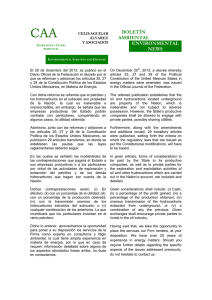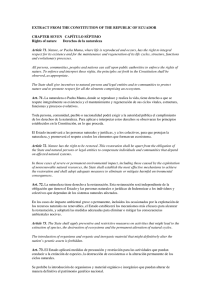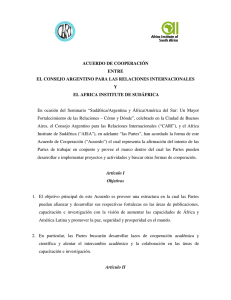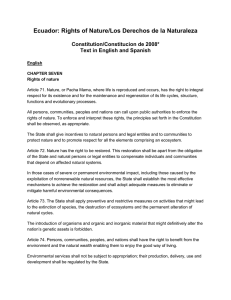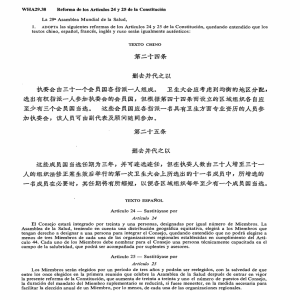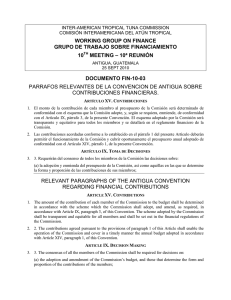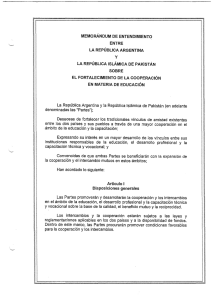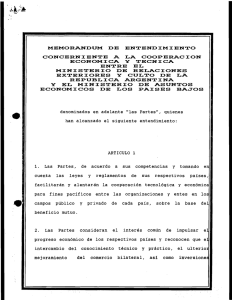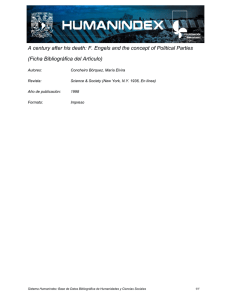AGREEMENT
Anuncio
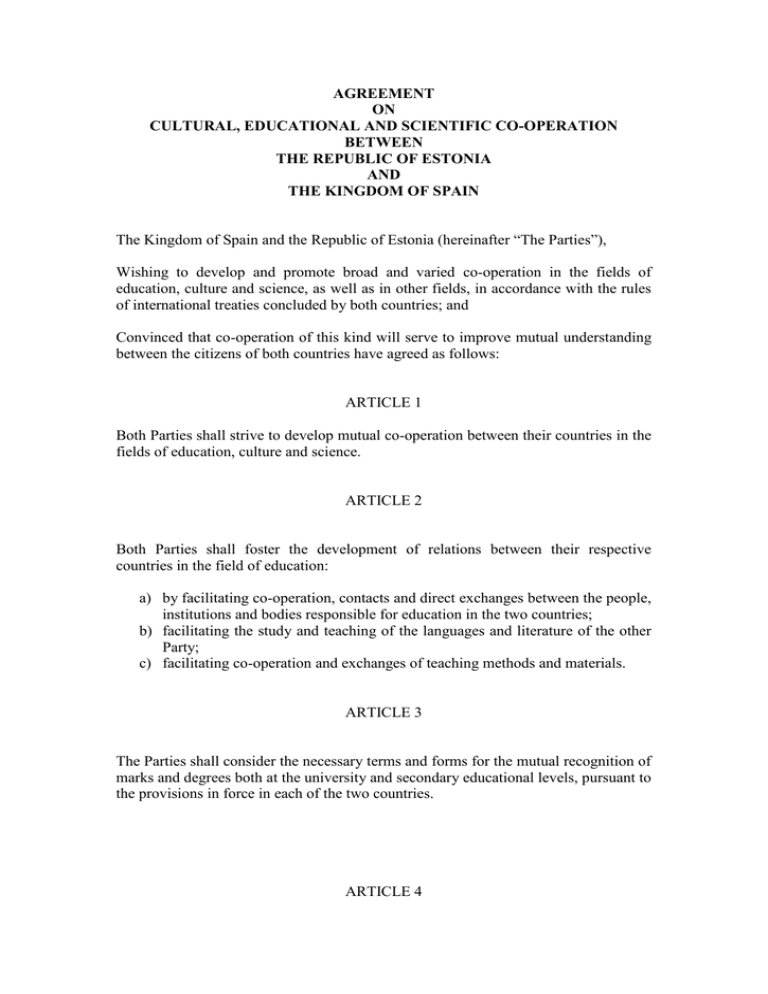
AGREEMENT ON CULTURAL, EDUCATIONAL AND SCIENTIFIC CO-OPERATION BETWEEN THE REPUBLIC OF ESTONIA AND THE KINGDOM OF SPAIN The Kingdom of Spain and the Republic of Estonia (hereinafter “The Parties”), Wishing to develop and promote broad and varied co-operation in the fields of education, culture and science, as well as in other fields, in accordance with the rules of international treaties concluded by both countries; and Convinced that co-operation of this kind will serve to improve mutual understanding between the citizens of both countries have agreed as follows: ARTICLE 1 Both Parties shall strive to develop mutual co-operation between their countries in the fields of education, culture and science. ARTICLE 2 Both Parties shall foster the development of relations between their respective countries in the field of education: a) by facilitating co-operation, contacts and direct exchanges between the people, institutions and bodies responsible for education in the two countries; b) facilitating the study and teaching of the languages and literature of the other Party; c) facilitating co-operation and exchanges of teaching methods and materials. ARTICLE 3 The Parties shall consider the necessary terms and forms for the mutual recognition of marks and degrees both at the university and secondary educational levels, pursuant to the provisions in force in each of the two countries. ARTICLE 4 With a view to preserving European culture in its broadest sense and promoting its development, both Parties shall stimulate better understanding and deeper knowledge of art, culture, and the cultural testimony of their respective peoples through exchange visits of people and activities. ARTICLE 5 Both Parties shall foster and facilitate direct contacts in the spheres of literature, the visual arts, scenic arts, music, cinema, architecture, museums, libraries and archives and other areas of culture. ARTICLE 6 Both Parties shall facilitate information exchange relative to measures aimed at protecting their cultural heritage. ARTICLE 7 Both Parties shall foster co-operation between their respective authorities with a view to guaranteeing the mutual protection of copyright and neighbouring rights within the framework of their respective legislation. ARTICLE 8 Both Parties shall foster contacts between their young people, as well as direct cooperation between the youth organisations of the two countries. ARTICLE 9 Both Parties shall foster co-operation between their sports organisations, as well as participation in sporting events that are held in each country. ARTICLE 10 The two Parties shall facilitate attendance at seminars, festivals, competitions, exhibitions, conferences, symposia and meetings in the areas covered under this Agreement, which will be held in both countries. ARTICLE 11 Both Parties shall strive to stimulate, develop and support scientific and technological co-operation between their respective institutions, based on equivalence, reciprocity and mutual interest, including exchanges of scientists and the promotion of common programmes of research and technological development. ARTICLE 12 In order to promote scientific and technical co-operation and to support their respective systems of science and technology, the Parties express their intention to study and cultivate co-operation in activities and projects of mutual interest, especially concerning European Union framework programmes for research, technological development and demonstration. The Parties shall promote meetings between the competent scientific authorities and agencies of both countries and shall foster relations between research centres in the two countries. The Parties shall promote activities such as the exchange of scientists, the development of joint research programmes, the organization of scientific congresses, the participation of scientists from one country in scientific conferences and meetings in the other country, the exchange of publications and information, as well as any other type of co-operation that may be agreed between the Parties or their researchoriented institutions. The Parties shall promote the exchange of documentation and information on new technologies, the execution of programmes to develop such technologies and meetings or conferences in this respect. For the purposes of the specific application of this Article, the Joint Committee referred to in Article 17 shall be responsible for: a) studying and fostering scientific and technical co-operation between the two countries; b) determining the priority areas of scientific and technological co-operation; a) evaluating the development of co-operation and advising on future measures for co-operation. ARTICLE 13 In the application and development of the present Agreement, universities, public research bodies and other scientific and technological institutions may conclude cooperation agreements among themselves, as long as they respect the domestic legislation in force in each Party and all other international provisions that are applicable. ARTICLE 14 The possible benefits, based on copyright, that may derive from the scientific and technological activities carried out within the framework of this Agreement shall be regulated by the international conventions to which both Parties are signatories and by the domestic legislation in force in each Party. The publication of the results of the scientific and technological activities that are conducted within the framework of this Agreement must be agreed to between the Parties who, in each case, may have participated in them. ARTICLE 15 Expenditures incurred by the activities carried out within the framework of this Agreement shall be met by the credits provided under the ordinary budget. ARTICLE 16 The Parties shall stimulate co-operation in the fields mentioned in this Agreement, without prejudice to the rights and obligations deriving for both Parties from other international agreements, as well as pursuant to the rules of the international organisations of which they are members. ARTICLE 17 The Parties hereby decide to set up a Joint Committee entrusted with the application of this Agreement, as well as with studying as many issues as may arise during the implementation thereof. The Joint Committee shall meet, periodically and alternatively, in one or other of the countries, and the dates and meeting places shall be determined through diplomatic channels. ARTICLE 18 Any discrepancy that may arise in the interpretation or application of this Agreement shall be resolved by negotiation between the Parties. This Agreement shall enter into force on the date of the last diplomatic note in which the Parties notify each other of the respective fulfilment of their domestic requirements for concluding international treaties. ARTICLE 19 This Agreement shall have an initial validity of five years and shall be tacitly renewed for successive periods of equal duration, unless either of the Parties should express its opposition thereto, which must be notified in writing through diplomatic channels with six months’ advance notice. The non-renewal of the Agreement shall not affect the implementation of the programmes, agreements or projects that have been started during the validity thereof, unless the Parties should agree otherwise. Done in …………………………. on ………………………. 2007, in Estonian, Spanish and English language, all texts being equally authentic. FOR THE REPUBLIC OF ESTONIA SPAIN FOR THE KINGDOM OF EESTI VABARIIGI JA HISPAANIA KUNINGRIIGI HARIDUS-, KULTUURI- JA TEADUSKOOSTÖÖ KOKKULEPE Eesti Vabariik ja Hispaania Kuningriik, edaspidi “pooled”, SOOVIDES arendada ja edendada laiapõhjalist ja mitmekesist koostööd hariduse, kultuuri ja teaduse alal ning muudes valdkondades kooskõlas mõlema riigi sõlmitud rahvusvahelistes lepingutes sätestatud normidega ja OLLES VEENDUNUD, et selline koostöö aitab tugevdada kahe riigi kodanike vastastikust mõistmist, on kokku leppinud järgmises. ARTIKKEL 1 Pooled püüavad arendada haridus-, kultuuri- ja teaduskoostööd. ARTIKKEL 2 Pooled edendavad haridussuhteid: a) soodustades inimeste, asutuste, sealhulgas nendes kahes riigis hariduse eest vastutavate asutuste koostööd, kontakte ja otsevahetust; b) soodustades teise poole keelte ja kirjanduse õppimist ja õpetamist; c) soodustades koostööd ning õppemeetodite ja -materjalide vahetust. ARTIKKEL 3 Pooled arutavad läbi hinnete ja teaduskraadide vastastikuseks tunnustamiseks vajalikud tingimused ja vormid nii ülikooli- kui ka keskhariduse tasemel mõlema riigi õigusaktide kohaselt. ARTIKKEL 4 Seades eesmärgiks säilitada Euroopa kultuuri selle laiemas mõttes ja seda edendada, ergutavad pooled oma rahvaste kunsti, kultuuri ja kultuuripärandi paremat mõistmist ja sügavamat tundmist inimeste vahetuse ning ühistegevuse kaudu. ARTIKKEL 5 Pooled edendavad ning soodustavad otsekontakte kirjanduse, kujutava kunsti, lavakunsti, muusika, filmikunsti, arhitektuuri, muuseumide, raamatukogude ja arhiivide alal ning muudes kultuurivaldkondades. ARTIKKEL 6 Pooled soodustavad oma kultuuripärandi kaitse meetmeid käsitleva teabe vahetust. ARTIKKEL 7 Pooled edendavad asjaomaste asutuste koostööd, et tagada oma õigusaktide alusel autoriõiguse ja sellega kaasnevate õiguste vastastikune kaitse. ARTIKKEL 8 Pooled edendavad noorte kontakte ja kahe riigi noorteorganisatsioonide otsekoostööd. ARTIKKEL 9 Pooled edendavad spordiorganisatsioonide koostööd ja osalemist mõlemas riigis peetavatel spordiüritustel. ARTIKKEL 10 Pooled soodustavad osavõttu mõlemas riigis peetavatest seminaridest, festivalidest, võistlustest, näitustest, konverentsidest, sümpoosionidest ja kohtumistest kokkuleppes käsitletud valdkondades. ARTIKKEL 11 Pooled püüavad võrdväärsuse ning vastastikuse kasu ja huvi alusel ergutada, arendada ja toetada asutuste teadus- ja tehnoloogiakoostööd, sealhulgas edendada teadlaste vahetust ning ühiseid teadusuuringuid ja tehnoloogiaarengu programme. ARTIKKEL 12 Selleks et edendada teadus- ja tehnikakoostööd ning toetada oma teadus- ja tehnoloogiasüsteeme, kavatsevad pooled teha uuringuid ja arendada koostööd vastastikust huvi pakkuvates tegevusvaldkondades ning projektides, eriti Euroopa Liidu teadusuuringute, tehnoloogiaarengu ja näitlikustamise raamprogrammides. Pooled aitavad kaasa mõlema riigi pädevate teadusorganisatsioonide ja -asutuste kohtumistele ning edendavad mõlema riigi teaduskeskuste suhteid. Pooled edendavad teadlaste vahetust, ühiste teadusprogrammide väljatöötamist, teaduskongresside korraldamist, ühe riigi teadlaste osalemist teise riigi teaduskongressidel ja -kohtumistel, väljaannete ja teabe vahetust ning mis tahes muud liiki koostööd, milles pooled või nende teadusuuringutega tegelevad asutused kokku lepivad. Pooled edendavad uusi tehnoloogiaid käsitleva dokumentatsiooni ja teabe vahetust, selliste tehnoloogiate väljatöötamiseks mõeldud programmide elluviimist ning sellealaseid kohtumisi ja konverentse. Selle artikli rakendamiseks vastutab artiklis 17 nimetatud ühiskomisjon järgmise eest: a) kahe riigi teadus- ja tehnikakoostöö uurimine ja edendamine; b) teadus- ja tehnoloogiakoostöö esmatähtsate valdkondade kindlaksmääramine; c) koostöö arengu hindamine ja nõustamine tuleviku koostöömeetmete suhtes. ARTIKKEL 13 Kokkuleppe rakendamisel ja arendamisel võivad ülikoolid, riiklikud teadusuuringute ühendused ning muud teadus- ja tehnoloogiaasutused sõlmida omavahel koostöökokkuleppeid, järgides kummagi poole riigisiseseid õigusakte ja kõiki kohaldatavaid rahvusvahelisi norme. ARTIKKEL 14 Kokkuleppe alusel läbiviidavast teadus- ja tehnoloogiategevusest tulenevaid võimalikke autoriõigusel põhinevaid tulusid reguleeritakse mõlema poole allkirjastatud rahvusvaheliste konventsioonide ja mõlema poole riigisiseste õigusaktidega. Kokkuleppe alusel läbiviidava teadus- ja tehnoloogiategevuse tulemuste avaldamise suhtes lepivad kokku igal üksikul juhul osalevad pooled. ARTIKKEL 15 Kokkuleppe alusel läbiviidavast tegevusest tulenevad kulud kaetakse korralise eelarve vahenditest. ARTIKKEL 16 Pooled ergutavad kokkuleppes nimetatud valdkondades tehtavat koostööd, piiramata kummagi poole õigusi ja kohustusi, mis tulenevad rahvusvahelistest kokkulepetest ja nende rahvusvaheliste organisatsioonide eeskirjadest, mille liikmeteks nad on. ARTIKKEL 17 Pooled otsustavad kokkuleppe rakendamiseks ja selle rakendamisel tekkida võivate küsimuste väljaselgitamiseks moodustada ühiskomisjoni. Ühiskomisjon tuleb kokku perioodiliselt ja vaheldumisi ühes ja teises riigis, kohtumiste kuupäevad ja kohad määratakse kindlaks diplomaatiliste kanalite kaudu. ARTIKKEL 18 Kokkuleppe tõlgendamisel või kohaldamisel tekkivad lahkarvamused lahendatakse pooltevaheliste läbirääkimiste teel. Kokkulepe jõustub viimase sellise diplomaatilise noodi kuupäeval, millega pooled teavitavad teineteist rahvusvaheliste lepingute sõlmimiseks ettenähtud riigisiseste nõudmiste täitmisest. ARTIKKEL 19 Kokkuleppe esialgne kehtivusaeg on viis aastat ja see pikeneb järgnevateks samasuguse kestusega ajavahemikeks, kui pool ei teata teisele poolele kirjalikult diplomaatiliste kanalite kaudu kuus kuud ette soovist kokkulepe lõpetada. Kokkuleppe lõpetamine ei mõjuta selle kehtivuse ajal alustatud programmide, lepingute või projektide rakendamist, kui pooled ei otsusta teisiti. Koostatud ... . juulil 2007. aastal ................................ eesti, hispaania ja inglise keeles, kõik tekstid on võrdselt autentsed. EESTI VABARIIGI NIMEL HISPAANIA KUNINGRIIGI NIMEL ACUERDO DE COOPERACIÓN CULTURAL, EDUCATIVA Y CIENTÍFICA ENTRE LA REPÚBLICA DE ESTONIA Y EL REINO DE ESPAÑA La República de Estonia y el Reino de España (en adelante denominados “las Partes”), Deseosos de desarrollar y promover la amplia y variada cooperación en los campos de la educación, la cultura y la ciencia, así como en otros sectores, conforme a las normas de los Tratados Internacionales concluidos por ambos países, y Convencidos de que la cooperación en dicho sentido habrá de servir para mejorar el entendimiento mutuo entre los ciudadanos de ambos países; Han acordado lo siguiente: ARTÍCULO 1 Ambas Partes se esforzarán por desarrollar la mutua cooperación entre sus países en campos de la educación, la cultura y la ciencia. ARTÍCULO 2 Ambas Partes fomentarán el desarrollo de las relaciones entre sus respectivos países en el ámbito de la educación: a) facilitando la cooperación, contactos e intercambios directos entre las personas, instituciones y organismos responsables de la educación de los dos países; b) facilitando el estudio y la enseñanza de las lenguas y de la literatura de la otra Parte; c) facilitando la cooperación y los intercambios de métodos y materiales de enseñanza; ARTÍCULO 3 Las Partes considerarán los términos y modalidades necesarios para el reconocimiento mutuo de grados y títulos tanto de nivel universitario como secundario, de acuerdo con las disposiciones vigentes en cada unos de los dos países. ARTÍCULO 4 Ambas Partes, con objeto de preservar la cultura europea en su sentido más amplio y promover su desarrollo, estimularán un mejor entendimiento y el más profundo conocimiento del arte, la cultura y el testimonio cultural de sus respectivos pueblos mediante el intercambio de visitas de personas y de actividades. ARTÍCULO 5 Ambas Partes fomentarán y facilitarán los contactos directos en los ámbitos de la literatura, las artes plásticas, las artes escénicas, la música, el cine, la arquitectura, los museos, las bibliotecas y archivos y en otras áreas de la cultura. ARTÍCULO 6 Ambas Partes facilitarán el intercambio de información relativa a las medidas encaminadas a la protección del patrimonio cultural. ARTÍCULO 7 Ambas Partes fomentarán la cooperación entre sus autoridades respectivas con miras a garantizar la protección mutua de los derechos de autor y derechos conexos dentro del marco de sus respectivas legislaciones. ARTÍCULO 8 Ambas Partes fomentarán los contactos entre la juventud, así como la cooperación directa entre las organizaciones juveniles de los dos países. ARTÍCULO 9 Ambas Partes fomentarán la cooperación entre las organizaciones deportivas, así como la participación en los acontecimientos deportivos que tengan lugar en cada unos de los dos países. ARTÍCULO 10 Ambas Partes facilitarán la asistencia a seminarios, festivales, competiciones, exposiciones, conferencias, simposios y reuniones en los ámbitos contemplados en el presente Convenio que se celebren en ambos países. ARTÍCULO 11 Ambas Partes se esforzarán por estimular, desarrollar y apoyar la cooperación científica y tecnológica entre sus respectivas instituciones basándose en la equivalencia, la reciprocidad y el mutuo interés, incluyendo el intercambio de científicos y la promoción de programas comunes de investigación y de desarrollo tecnológico. ARTÍCULO 12 Con el fin de fomentar la cooperación científico-técnica y reforzar los respectivos sistemas de ciencia y tecnología, las Partes manifiestan su voluntad de estudiar e impulsar la colaboración en actividades y proyectos de interés común, en particular en el marco de los programas marco de investigación, desarrollo tecnológico y demostración de la Unión Europea. Las Partes favorecerán encuentros entre entidades y autoridades científicas competentes de ambos países y fomentarán las relaciones entre los centros de investigación de los dos países. Las Partes podrán promocionar actividades como el intercambio de científicos, el desarrollo de programas comunes de investigación, la organización de congresos científicos, la participación de científicos de un país en conferencias y reuniones científicas del otro país, el intercambio de publicaciones e información, así como cualquier otro tipo de colaboración que puedan acordar las Partes o sus instituciones dedicadas a la investigación. Las Partes podrán promocionar el intercambio de documentación e información sobre nuevas tecnologías, la ejecución de programas de desarrollo de estas tecnologías y la celebración de reuniones o conferencias al respecto. A los efectos de la aplicación específica de este artículo, la Comisión Mixta a la que se refiere el artículo 17 estará encargada de: b) estudiar e impulsar la cooperación científica y técnica entre ambos países, c) decidir las áreas prioritarias de cooperación científica y tecnológica, d) evaluar el desarrollo de la cooperación y asesorar sobre futuras medidas de cooperación. ARTÍCULO 13 En aplicación y desarrollo del presente Acuerdo las universidades, los organismos públicos de investigación y otras instituciones científico-tecnológicas de las Partes podrán concluir acuerdos de cooperación entre ellas, respetando las disposiciones internas vigentes en cada Parte y cuantas otras internacionales deban ser aplicadas. ARTÍCULO 14 Los posibles beneficios que pudieran derivarse de las actividades científicotecnológicas que se lleven a cabo en el marco de este Acuerdo, en base a los derechos de propiedad intelectual que puedan resultar de ellas, se regirán por los Convenios Internacionales de los que ambas Partes sean signatarios y por la legislación interna vigente en cada Parte. La publicación de los resultados de las actividades científico-tecnológicas que se lleven a cabo en el marco de este Acuerdo deberá concertarse entre las partes que, en cada caso, hayan intervenido en las mismas. ARTÍCULO 15 Los gastos que se deriven de las actividades realizadas en el marco del presente Acuerdo, se cubrirán con cargo a los créditos previstos en el presupuesto ordinario. ARTÍCULO 16 Las Partes estimularán la cooperación en los campos mencionados en el presente Acuerdo, sin perjuicio de los derechos y obligaciones que se deriven para ambas Partes de otros acuerdos internacionales que hayan suscrito, así como de conformidad con las normas de las organizaciones internacionales de que sean miembros. ARTÍCULO 17 Las Partes deciden constituir una Comisión Mixta encargada de la aplicación del presente Acuerdo, así como del estudio de cuantas cuestiones puedan surgir en el desarrollo del mismo. La Comisión Mixta se reunirá, de forma periódica y alternativamente, en uno y otro país, determinándose la fecha y lugar de reunión por vía diplomática. ARTÍCULO 18 Cualquier discrepancia que pudiera surgir en la interpretación o aplicación de este Acuerdo se resolverá por negociaciones entre las Partes. El presente Acuerdo entrará en vigor en la fecha de la última nota diplomática en la que las partes se comuniquen respectivamente el cumplimiento de los requisitos internos para la celebración de tratados internacionales. ARTÍCULO 19 El presente Acuerdo tendrá una vigencia inicial de cinco años y se renovará tácitamente por períodos sucesivos de igual duración, salvo manifestación en contra de una de las Partes, que se notificará por escrito y por vía diplomática con un preaviso de seis meses. La no renovación del Acuerdo no afectará a la aplicación de los programas, convenios o proyectos que se hayan iniciado durante su vigencia, a menos que las Partes acuerden otra cosa. Hecho en ……………. el ……….. de 2007 en los idiomas estonio, español e inglés, siendo todos los textos igualmente auténticos. POR LA REPÚBLICA DE ESTONIA ESPAÑA POR EL REINO DE
